General Chicago Outfit Info Dumping Ground
Moderator: Capos
Re: General Chicago Outfit Info Dumping Ground
Serritella's comment is also very important..."committee meetings of key figures"...which corresponds with what Snakes said and also what B previously explained
Do not be deceived, neither the sexually immoral, nor idolaters, nor adulterers, nor men who practice homosexuality, nor thieves, nor the greedy, nor drunkards, nor revilers, nor swindlers will inherit the kingdom of God - Corinthians 6:9-10
- PolackTony
- Filthy Few
- Posts: 5844
- Joined: Thu May 28, 2020 10:54 am
- Location: NYC/Chicago
Re: General Chicago Outfit Info Dumping Ground
+2, I think this is emerging as our best model given the available evidence. I'd note also that the criteria Snakes identifies here for the "leadership group" early in the Outfit's development was likely also the criteria for those initially inducted from 1928-31 as made members of the Mafia in Chicago. I think these core LCN members and the top non-Italians like Guzik formed the initial BOD as a top echelon leadership strata in the Chicago Syndicate. As the Outfit developed and took on its unique character of an LCN/Capone Syndicate hybrid, I think we see the development of the BOD take on the character later documented by these CIS, of the leadership admin and top district bosses.Villain wrote: ↑Fri Sep 11, 2020 2:19 pmI think you might be spot on...Snakes wrote: ↑Fri Sep 11, 2020 1:18 pm I also want to reiterate that I think this "leadership group" (however we want to describe it) initially consisted of the biggest earners and most powerful members and later evolved into specifically including the administration and territorial bosses before possibly disappearing sometime in the nineties due to the shrinking of the Outfit, although I could be way off here.
"Hey, hey, hey — this is America, baby! Survival of the fittest.”
- PolackTony
- Filthy Few
- Posts: 5844
- Joined: Thu May 28, 2020 10:54 am
- Location: NYC/Chicago
Re: General Chicago Outfit Info Dumping Ground
The odd number sitting on the Committee/BOD of course becomes critical when/if the BOD functioned as a deliberative body that voted on policy and practices. I still have a big question as to whether the Oufit voted on matters, or whether these BOD meetings were convened more as briefing sessions where the top bosses were informed of important decisions affecting Syndicate-wide matters or those pertaining to particular districts handed down from the top admin ("The Man" and the "Number 1").B. wrote: ↑Fri Sep 11, 2020 1:23 pm Thanks for the other reference.
Interesting seven "elder statesmen" are mentioned by the 1970/71 informant, while five are mentioned on the "Committee" by the Italian-Jewish informant. I'm not trying to force the consiglio idea, only considering it, but the consiglio in other families appears to have always included an odd number of members (coincidentally five to seven) and is described as a "council", "chair" (seggia), and "inner ring" responsible for administering the organization and setting policy.
"Hey, hey, hey — this is America, baby! Survival of the fittest.”
- PolackTony
- Filthy Few
- Posts: 5844
- Joined: Thu May 28, 2020 10:54 am
- Location: NYC/Chicago
Re: General Chicago Outfit Info Dumping Ground
I think it's an important distinct you reiterate in your last sentence, as from what we can see thus far the Outfit BOD seems to have been much more executive heavy then the Commission. While the boss/number 1 was responsible for day to day executive responsibilities, ultimate executive authority and veto power seems to have rested in the Chairman/"The Man".Villain wrote: ↑Fri Sep 11, 2020 1:50 pmIts cool man and i know that you are not forcing the idea since this fits with a lot of stuff and as i previouy said, Chicago sometimes had between 6 or 7 board members with Ricca being the "chairman", obviously later replaced by Accardo. But as I previously said, this "chairman" was "slightly" different than the commission's chairman for exampleB. wrote: ↑Fri Sep 11, 2020 1:23 pm Thanks for the other reference.
Interesting seven "elder statesmen" are mentioned by the 1970/71 informant, while five are mentioned on the "Committee" by the Italian-Jewish informant. I'm not trying to force the consiglio idea, only considering it, but the consiglio in other families appears to have always included an odd number of members (coincidentally five to seven) and is described as a "council", "chair" (seggia), and "inner ring" responsible for administering the organization and setting policy.
I think it was Frank who above asked to what degree decisions were reached using consensus rather than just being dictated by the executive. This to me remains a huge question. Even if ultimate executive authority resided in "The Man", how much of this was formal and how much functional? Do we have clear examples of apparent disagreements on specific policy matters or decisions where the admin disagreed, and if so how were decisions or compromises reached? Did Ricca or Accardo simply say "this is how it's gonna be and I don't care if you mugs don't like it"? Or perhaps an effort was made by the top admin to build consensus -- say under Giancana's tenure, Mooney, Ricca, and JB argued or settled their differences and then dictated their decision as a pronouncement to the BOD? Or did they put their decisions forward to the BOD and take the opinions or even votes of the area bosses into consideration? If the latter ever happened, did the BOD vote or pass judgment as a body, or if it was not a Syndicate-wide matter did only those district bosses with interests at stake have sole degree of input?
"Hey, hey, hey — this is America, baby! Survival of the fittest.”
Re: General Chicago Outfit Info Dumping Ground
Even better explained, thanksPolackTony wrote: ↑Fri Sep 11, 2020 5:03 pm+2, I think this is emerging as our best model given the available evidence. I'd note also that the criteria Snakes identifies here for the "leadership group" early in the Outfit's development was likely also the criteria for those initially inducted from 1928-31 as made members of the Mafia in Chicago. I think these core LCN members and the top non-Italians like Guzik formed the initial BOD as a top echelon leadership strata in the Chicago Syndicate. As the Outfit developed and took on its unique character of an LCN/Capone Syndicate hybrid, I think we see the development of the BOD take on the character later documented by these CIS, of the leadership admin and top district bosses.Villain wrote: ↑Fri Sep 11, 2020 2:19 pmI think you might be spot on...Snakes wrote: ↑Fri Sep 11, 2020 1:18 pm I also want to reiterate that I think this "leadership group" (however we want to describe it) initially consisted of the biggest earners and most powerful members and later evolved into specifically including the administration and territorial bosses before possibly disappearing sometime in the nineties due to the shrinking of the Outfit, although I could be way off here.
Do not be deceived, neither the sexually immoral, nor idolaters, nor adulterers, nor men who practice homosexuality, nor thieves, nor the greedy, nor drunkards, nor revilers, nor swindlers will inherit the kingdom of God - Corinthians 6:9-10
Re: General Chicago Outfit Info Dumping Ground
I agree, the Chairman aka the Man had the last word on all important issues. Ricca was a commission rep or aide or whatever we want to call it, for 40+ years...Accardo was boss for almost 10 years and later after Riccas death became the Man until his death in 92.PolackTony wrote: ↑Fri Sep 11, 2020 5:20 pmI think it's an important distinct you reiterate in your last sentence, as from what we can see thus far the Outfit BOD seems to have been much more executive heavy then the Commission. While the boss/number 1 was responsible for day to day executive responsibilities, ultimate executive authority and veto power seems to have rested in the Chairman/"The Man".Villain wrote: ↑Fri Sep 11, 2020 1:50 pmIts cool man and i know that you are not forcing the idea since this fits with a lot of stuff and as i previouy said, Chicago sometimes had between 6 or 7 board members with Ricca being the "chairman", obviously later replaced by Accardo. But as I previously said, this "chairman" was "slightly" different than the commission's chairman for exampleB. wrote: ↑Fri Sep 11, 2020 1:23 pm Thanks for the other reference.
Interesting seven "elder statesmen" are mentioned by the 1970/71 informant, while five are mentioned on the "Committee" by the Italian-Jewish informant. I'm not trying to force the consiglio idea, only considering it, but the consiglio in other families appears to have always included an odd number of members (coincidentally five to seven) and is described as a "council", "chair" (seggia), and "inner ring" responsible for administering the organization and setting policy.
I think it was Frank who above asked to what degree decisions were reached using consensus rather than just being dictated by the executive. This to me remains a huge question. Even if ultimate executive authority resided in "The Man", how much of this was formal and how much functional? Do we have clear examples of apparent disagreements on specific policy matters or decisions where the admin disagreed, and if so how were decisions or compromises reached? Did Ricca or Accardo simply say "this is how it's gonna be and I don't care if you mugs don't like it"? Or perhaps an effort was made by the top admin to build consensus -- say under Giancana's tenure, Mooney, Ricca, and JB argued or settled their differences and then dictated their decision as a pronouncement to the BOD? Or did they put their decisions forward to the BOD and take the opinions or even votes of the area bosses into consideration? If the latter ever happened, did the BOD vote or pass judgment as a body, or if it was not a Syndicate-wide matter did only those district bosses with interests at stake have sole degree of input?
In plane words these guys were the supreme power...boss of all bosses...during the old days besides having complete control over the second largest city, they also controlled other smaller cities around the country and on top of that, they had interests all around the world....so Chicago had its own "commission" with one "boss of all bosses" at the top.
When Roselli started making trouble in 66, Battaglia didnt care...besides being his capo LaPorte received the middle finger from Roselli...BUT when Ricca personally called Roselli, suddenly the situation completely changed....also when Giancana left the country, Cerone thought that he had the backing of both Ricca and Accardo to become the boss, but he thought wrong since Ricca said "no" and gave the throne to Battaglia.
Regarding Frank's question....as I already said in one of my previous posts...the whole deal depended on the situation
For example, Ferraro represented the South Side mob and when he got sick, most of the guys present on that meeting were leaders from his own faction. Ricca and Accardo presented Alex (with Humphreys help) to take over Ferraros place as boss of the South Side, and also announced to them that Battaglia was going to be the new underboss.
Same as when Giancana got replaced....Giancana belonged to the West Side mob and the guys present on the meeting were only west side guys such as Battaglia, Alderisio, Daddono etc. and again, Ricca and Accardo decided for Battaglia to take Giancanas place, while Alderisio became the number 2 guy or the underboss. Previously Accardo took Battaglia to a dozen of fishing trips lol meaning he was grooming him
Or when Alex asked Accardo regarding new "contracts" which means that Ricca and Accardo previously talked it out and decided on who was going to be whacked and who wasnt. Or when Prio died, Aiuppa previously received the decision from Accardo and Alex and simply informed everyone from the North Side that DiBella is the new boss of that same faction and to wait for further instructions.
BUT we can also see examples with voting like in the Capone family case, meaning when Giancana became the boss he nixed the help for the Capone family, with he, Alex, Ferraro and some other guys giving their votes against it. The old timers like Humphreys were angry about it but they had to take it. Also we can see Accardo and Ricca talking about replacing or even murdering D'Arco and Accardo says something like he bet that Humphreys was going to be against it and that Alex wasnt going to care much, which gives us a glimpse of some type of voting style but if you look at the whole convo, you will realize that Accardo was in fact convincing Ricca to skip Humphreys and Alex opinions and to do it on their own, which again means that Ricca had the last word. In the end D'Arco remained alive and was later simply replaced, which means that Humphreys advise probably prevailed again lol and he was right since John wasnt the informer
It seems that when it came down to important matters such as picking a new boss or underboss or capo or murder, most of the decisions were already made by the top 3 guys who later simply announced it to the rest of the fellas, but if the situation contained less important stuff like helping some1 or regarding some scheme or replacing some soldier, they usually voted about it. If Ricca, Accardo and Giancana all said "yes", then i think we all know what the rest of the organization was going to say lol
Thats my opinion on the situation.
Do not be deceived, neither the sexually immoral, nor idolaters, nor adulterers, nor men who practice homosexuality, nor thieves, nor the greedy, nor drunkards, nor revilers, nor swindlers will inherit the kingdom of God - Corinthians 6:9-10
Re: General Chicago Outfit Info Dumping Ground
Really interesting information here with this informant. It reinforces a lot of what we have suspected about the leadership structure.
One thing I would add. While there is no doubt that Ricca was the Official chairman or top boss until 1971/72, if you review as many FBI documents as you can get from 40s-60s There is no doubt that Tony Accardo held a significant sway over the organization during a lot of that time as well. It is my belief that while his title might not have been officially on the same level as Ricca, I believe certainly by 67 or 68 he had achieved a status that was about equal with Ricca in terms of their influence over the organization.
I know Villian has a theory that JB and Ricca had a falling out in the early 60s. This may be true, and perhaps his power waned during that time. However, I always revisit the Mary Farrell document from 57 or 58 where JB is chatting with Giancana. They are discussing commission matters, and while Accardos role may have been an “advisor” at that point, the tone of that conversation is clearly that of a superior talking to a subordinate. It is less Accardo giving him advice, and more Accardo out right telling him what to do. His power may have been reduced after that in the early 60s, but surely by the late 60s he was nearly on an equal footing with Paul Ricca. The FBI documents that villain posted previously from the early 70s that discusses the transition of power in the new leader ship, clearly states that Ricca and Accardo had been pretty much sharing power, and that Riccas position as a “co top boss” would not be replaced.
One thing I would add. While there is no doubt that Ricca was the Official chairman or top boss until 1971/72, if you review as many FBI documents as you can get from 40s-60s There is no doubt that Tony Accardo held a significant sway over the organization during a lot of that time as well. It is my belief that while his title might not have been officially on the same level as Ricca, I believe certainly by 67 or 68 he had achieved a status that was about equal with Ricca in terms of their influence over the organization.
I know Villian has a theory that JB and Ricca had a falling out in the early 60s. This may be true, and perhaps his power waned during that time. However, I always revisit the Mary Farrell document from 57 or 58 where JB is chatting with Giancana. They are discussing commission matters, and while Accardos role may have been an “advisor” at that point, the tone of that conversation is clearly that of a superior talking to a subordinate. It is less Accardo giving him advice, and more Accardo out right telling him what to do. His power may have been reduced after that in the early 60s, but surely by the late 60s he was nearly on an equal footing with Paul Ricca. The FBI documents that villain posted previously from the early 70s that discusses the transition of power in the new leader ship, clearly states that Ricca and Accardo had been pretty much sharing power, and that Riccas position as a “co top boss” would not be replaced.
Re: General Chicago Outfit Info Dumping Ground
I agree on what you said. Besides all of the Cosa Nostra, organizational or operational things that went down, we must not forget that most of these guys were friends. Ricca and Accardo probably knew each other since the late 1920s, and besides their beef during the period of 1953-1955 (not early 60s), they still remained friends until the end.Coloboy wrote: ↑Sat Sep 12, 2020 11:10 am Really interesting information here with this informant. It reinforces a lot of what we have suspected about the leadership structure.
One thing I would add. While there is no doubt that Ricca was the Official chairman or top boss until 1971/72, if you review as many FBI documents as you can get from 40s-60s There is no doubt that Tony Accardo held a significant sway over the organization during a lot of that time as well. It is my belief that while his title might not have been officially on the same level as Ricca, I believe certainly by 67 or 68 he had achieved a status that was about equal with Ricca in terms of their influence over the organization.
I know Villian has a theory that JB and Ricca had a falling out in the early 60s. This may be true, and perhaps his power waned during that time. However, I always revisit the Mary Farrell document from 57 or 58 where JB is chatting with Giancana. They are discussing commission matters, and while Accardos role may have been an “advisor” at that point, the tone of that conversation is clearly that of a superior talking to a subordinate. It is less Accardo giving him advice, and more Accardo out right telling him what to do. His power may have been reduced after that in the early 60s, but surely by the late 60s he was nearly on an equal footing with Paul Ricca. The FBI documents that villain posted previously from the early 70s that discusses the transition of power in the new leader ship, clearly states that Ricca and Accardo had been pretty much sharing power, and that Riccas position as a “co top boss” would not be replaced.
But we also must not forget that Ricca was older than Accardo and was looked upon as a rising star in the underworld since 1926 or when Capone became his best man at his wedding, while Accardo was "nobody" at the time. So i think that Accardo probably looked at Ricca as some type of mentor and friend and as a matter of fact, from 1970 until Riccas death, we can see Accardo constantly driving Ricca around since their "lackey" Cerone was in prison at the time. Some say that Accardo cried at Riccas funeral which again was a sign for their long time friendship.
So my point is that their long time friendship and mutual respect was probably the key for sharing their power in Chicagos underworld at the time, and as they got older, i think that their official spots slowly stopped making difference between the two. But when Ricca died, Accardo obviously didnt share his spot with anyone and created an organization similar to the Third Reich. Members were killed for dealing dope, capos took the fall for him and went to jail, people were killed for breaking into his home, etc. Theres no question that the old man became supreme boss of the Outfit since there was no1 like Ricca next to him anymore
Do not be deceived, neither the sexually immoral, nor idolaters, nor adulterers, nor men who practice homosexuality, nor thieves, nor the greedy, nor drunkards, nor revilers, nor swindlers will inherit the kingdom of God - Corinthians 6:9-10
- PolackTony
- Filthy Few
- Posts: 5844
- Joined: Thu May 28, 2020 10:54 am
- Location: NYC/Chicago
Re: General Chicago Outfit Info Dumping Ground
Thanks, this is a great summary.Villain wrote: ↑Sat Sep 12, 2020 12:06 pmI agree on what you said. Besides all of the Cosa Nostra, organizational or operational things that went down, we must not forget that most of these guys were friends. Ricca and Accardo probably knew each other since the late 1920s, and besides their beef during the period of 1953-1955 (not early 60s), they still remained friends until the end.Coloboy wrote: ↑Sat Sep 12, 2020 11:10 am Really interesting information here with this informant. It reinforces a lot of what we have suspected about the leadership structure.
One thing I would add. While there is no doubt that Ricca was the Official chairman or top boss until 1971/72, if you review as many FBI documents as you can get from 40s-60s There is no doubt that Tony Accardo held a significant sway over the organization during a lot of that time as well. It is my belief that while his title might not have been officially on the same level as Ricca, I believe certainly by 67 or 68 he had achieved a status that was about equal with Ricca in terms of their influence over the organization.
I know Villian has a theory that JB and Ricca had a falling out in the early 60s. This may be true, and perhaps his power waned during that time. However, I always revisit the Mary Farrell document from 57 or 58 where JB is chatting with Giancana. They are discussing commission matters, and while Accardos role may have been an “advisor” at that point, the tone of that conversation is clearly that of a superior talking to a subordinate. It is less Accardo giving him advice, and more Accardo out right telling him what to do. His power may have been reduced after that in the early 60s, but surely by the late 60s he was nearly on an equal footing with Paul Ricca. The FBI documents that villain posted previously from the early 70s that discusses the transition of power in the new leader ship, clearly states that Ricca and Accardo had been pretty much sharing power, and that Riccas position as a “co top boss” would not be replaced.
But we also must not forget that Ricca was older than Accardo and was looked upon as a rising star in the underworld since 1926 or when Capone became his best man at his wedding, while Accardo was "nobody" at the time. So i think that Accardo probably looked at Ricca as some type of mentor and friend and as a matter of fact, from 1970 until Riccas death, we can see Accardo constantly driving Ricca around since their "lackey" Cerone was in prison at the time. Some say that Accardo cried at Riccas funeral which again was a sign for their long time friendship.
So my point is that their long time friendship and mutual respect was probably the key for sharing their power in Chicagos underworld at the time, and as they got older, i think that their official spots slowly stopped making difference between the two. But when Ricca died, Accardo obviously didnt share his spot with anyone and created an organization similar to the Third Reich. Members were killed for dealing dope, capos took the fall for him and went to jail, people were killed for breaking into his home, etc. Theres no question that the old man became supreme boss of the Outfit since there was no1 like Ricca next to him anymore
I know it's been done before, but what factors precipitated the Ricca/Accardo split in the '50's? I'd imagine Accardo had been too brash and flashy (funny enough, a bit like Giancana later), and had brought too much heat and attention down with stuff like his narcotics involvement (can't have helped his relationship with Ricca much that Chicago media were referring to JB as the "kingpin" of narcotics in the Midwest), the horsemeat scandal, his ostentatious mansion etc. Following this, how was the split resolved?
"Hey, hey, hey — this is America, baby! Survival of the fittest.”
Re: General Chicago Outfit Info Dumping Ground
Long time ago Snakes confirmed this to me by showing me info with a general statement like Accardo didnt want to step down for Ricca but there are more than few additional specifics....PolackTony wrote: ↑Sat Sep 12, 2020 12:21 pm
Thanks, this is a great summary.
I know it's been done before, but what factors precipitated the Ricca/Accardo split in the '50's? I'd imagine Accardo had been too brash and flashy (funny enough, a bit like Giancana later), and had brought too much heat and attention down with stuff like his narcotics involvement (can't have helped his relationship with Ricca much that Chicago media were referring to JB as the "kingpin" of narcotics in the Midwest), the horsemeat scandal, his ostentatious mansion etc. Following this, how was the split resolved?
When Ricca and Campagna got out of jail in 1947, they were the ones who removed Fischetti and placed Accardo as the new boss and also elevated Giancana as the new underboss since Campagna was one of Giancanas sponsors while Ricca was his "Godfather". Fischetti took a step back because of health issues.
So during that period Ricca wanted to keep things quiet mainly because he and Campagna were constantly under the watchful eye of both the goverment and the media and were constantly going in and out of court. Those were the days when both of them were still prosecuted for the national scandal regarding their early release.
But as you already said, Accardo had to buy that huge mansion and on top of that, by the late 40s his personal crew (EP) together with Joe Fuscos guys managed to screw up the whole cigarette business. That was strike one.
Strike two occurred, again like you already mentioned, with the horse meat scandal. During the trials both Ricca and Campagna were mentioned as being the leaders of the Outfit and this allegedly made Ricca quite made. First they lost one of their most lucrative rackets and second, they didnt need any additional heat at the time since both Ricca and Campagna were already with one foot in jail. In fact, years later few Outfit members were recorded by the feds while trash talking Accardo and that he never souldve brought that guy Siciliano into the game.
Strike three or the moment when Accardo crossed the line occurred in 1953/54, when he together with Bruno Roti (territorial boss of the South), Sam Hunt (crew boss under Rotis regime) and Ross Prio (t. boss of the North) tried to exclude the West Side faction from the whole bartenders and waiters union scheme. Accardo was quite close associate with Roti at the time and in fact they were the ones who created the new First Ward lineup during the early 50s with D'Arco and Marcy.
During those days Battaglia became the new boss of the west side mob under the jurisdiction of the underboss aka Giancana. So the enforcers who headed Accardos scheme were Paul Labriola and Jimmy Weinberg and i believe that these guys belonged to the EP crew. They were told never to mention any of the bosses' names if asked about the scheme and if they received pressure from some of the members, they were told to send them to one of Hunts guys (collateral damage).
The problem was that one of Labriolas old time associates Nick Kokenes was close friend of Alex and told him about the scheme. After that Alex went straight to Battaglia and told him everything.
Story goes Battaglia became mad and wanted a sit down with Labriola. During the sit dow, both Labriola and Weinberg made a huge mistake by threatening Battaglia with the names of Roti and Hunt.
Battaglia was Riccas guy and so in no time, contracts were given for the lives of both Labriola and Weinberg. Sources say that Roti and Hunt allegedly told everyone that they had nothing to do with the scheme and that the whole project was headed by Labriola himself. Also story goes that Weinberg begged Alex to get him off the hook and as a matter of fact, it was Alex who allegedly assured them that he can arrange another meeting which in fact was a trap for their own demise.
Shortly after their murders, a peace delegation made out of two Genovese big shots and former Capone associates, John Torrio and Tony Ricci, arrived in Chicago and held several meetings with both Ricca and Accardo in some North Side hotel (other sources say that other peace delegations also previously arrived in Chicago from NY but no names). On top of that, in 1955 both Capezio (Accardos best friend, protector and mentor) and Campagna (Riccas best friend and protector) died of natural causes, which i believe was the real moment for them to squash their beef and developed one strong alliance and new friendship that lasted until the end.
By the end of 1955 Hunt was out of Chicago and in 1956 died in NY i think, i dont remember right now. Also, by 1956 Rotis South Side mob was slowly taken over by Ferraro and Alex. In 57 Roti died and his son-in-law Caruso became a capo but wasnt able to control the whole South Side faction and thats why he was subordinate to Alex and Ferraro.
Do not be deceived, neither the sexually immoral, nor idolaters, nor adulterers, nor men who practice homosexuality, nor thieves, nor the greedy, nor drunkards, nor revilers, nor swindlers will inherit the kingdom of God - Corinthians 6:9-10
- PolackTony
- Filthy Few
- Posts: 5844
- Joined: Thu May 28, 2020 10:54 am
- Location: NYC/Chicago
Re: General Chicago Outfit Info Dumping Ground
Thanks, great explanation.Villain wrote: ↑Sat Sep 12, 2020 1:05 pmLong time ago Snakes confirmed this to me by showing me info with a general statement like Accardo didnt want to step down for Ricca but there are more than few additional specifics....PolackTony wrote: ↑Sat Sep 12, 2020 12:21 pm
Thanks, this is a great summary.
I know it's been done before, but what factors precipitated the Ricca/Accardo split in the '50's? I'd imagine Accardo had been too brash and flashy (funny enough, a bit like Giancana later), and had brought too much heat and attention down with stuff like his narcotics involvement (can't have helped his relationship with Ricca much that Chicago media were referring to JB as the "kingpin" of narcotics in the Midwest), the horsemeat scandal, his ostentatious mansion etc. Following this, how was the split resolved?
When Ricca and Campagna got out of jail in 1947, they were the ones who removed Fischetti and placed Accardo as the new boss and also elevated Giancana as the new underboss since Campagna was one of Giancanas sponsors while Ricca was his "Godfather". Fischetti took a step back because of health issues.
So during that period Ricca wanted to keep things quiet mainly because he and Campagna were constantly under the watchful eye of both the goverment and the media and were constantly going in and out of court. Those were the days when both of them were still prosecuted for the national scandal regarding their early release.
But as you already said, Accardo had to buy that huge mansion and on top of that, by the late 40s his personal crew (EP) together with Joe Fuscos guys managed to screw up the whole cigarette business. That was strike one.
Strike two occurred, again like you already mentioned, with the horse meat scandal. During the trials both Ricca and Campagna were mentioned as being the leaders of the Outfit and this allegedly made Ricca quite made. First they lost one of their most lucrative rackets and second, they didnt need any additional heat at the time since both Ricca and Campagna were already with one foot in jail. In fact, years later few Outfit members were recorded by the feds while trash talking Accardo and that he never souldve brought that guy Siciliano into the game.
Strike three or the moment when Accardo crossed the line occurred in 1953/54, when he together with Bruno Roti (territorial boss of the South), Sam Hunt (crew boss under Rotis regime) and Ross Prio (t. boss of the North) tried to exclude the West Side faction from the whole bartenders and waiters union scheme. Accardo was quite close associate with Roti at the time and in fact they were the ones who created the new First Ward lineup during the early 50s with D'Arco and Marcy.
During those days Battaglia became the new boss of the west side mob under the jurisdiction of the underboss aka Giancana. So the enforcers who headed Accardos scheme were Paul Labriola and Jimmy Weinberg and i believe that these guys belonged to the EP crew. They were told never to mention any of the bosses' names if asked about the scheme and if they received pressure from some of the members, they were told to send them to one of Hunts guys (collateral damage).
The problem was that one of Labriolas old time associates Nick Kokenes was close friend of Alex and told him about the scheme. After that Alex went straight to Battaglia and told him everything.
Story goes Battaglia became mad and wanted a sit down with Labriola. During the sit dow, both Labriola and Weinberg made a huge mistake by threatening Battaglia with the names of Roti and Hunt.
Battaglia was Riccas guy and so in no time, contracts were given for the lives of both Labriola and Weinberg. Sources say that Roti and Hunt allegedly told everyone that they had nothing to do with the scheme and that the whole project was headed by Labriola himself. Also story goes that Weinberg begged Alex to get him off the hook and as a matter of fact, it was Alex who allegedly assured them that he can arrange another meeting which in fact was a trap for their own demise.
Shortly after their murders, a peace delegation made out of two Genovese big shots and former Capone associates, John Torrio and Tony Ricci, arrived in Chicago and held several meetings with both Ricca and Accardo in some North Side hotel (other sources say that other peace delegations also previously arrived in Chicago from NY but no names). On top of that, in 1955 both Capezio (Accardos best friend, protector and mentor) and Campagna (Riccas best friend and protector) died of natural causes, which i believe was the real moment for them to squash their beef and developed one strong alliance and new friendship that lasted until the end.
By the end of 1955 Hunt was out of Chicago and in 1956 died in NY i think, i dont remember right now. Also, by 1956 Rotis South Side mob was slowly taken over by Ferraro and Alex. In 57 Roti died and his son-in-law Caruso became a capo but wasnt able to control the whole South Side faction and thats why he was subordinate to Alex and Ferraro.
For some reason, I thought that Labriola was knocked down because of the cigarette thing, as well as some murder that he was implicated in (I forget the details now).
"Hey, hey, hey — this is America, baby! Survival of the fittest.”
Re: General Chicago Outfit Info Dumping Ground
You're welcome.PolackTony wrote: ↑Sat Sep 12, 2020 1:51 pm
Thanks, great explanation.
For some reason, I thought that Labriola was knocked down because of the cigarette thing, as well as some murder that he was implicated in (I forget the details now).
Labriola was one of those wild guys and was known for making problems and so i have no doubt that he did other mistakes too. For example when they had their invasion in Dallas, Labriola allegedly tried to extort one of their own guys Marcus Lipsky i think it was, who in turn was one of the leading figures in the whole project (Lipsky was respected associate of the old North Side mob). Labriola was told to back off but he didnt and so they had to send Nick DeJoh to Dallas and to fix the situation. Lots of interesting info can be found regarding the Dallas situation in the Paul Roland Jones files
Labriola was in DeJohns crew at the time under the jurisdiction of the Northsiders, and after DeJohns demise, Labriola allegedly transferred to EP under Accardo. Both DeJohn and Labriola belonged to Grand, an area which after the 1940s conflict was taken from the Northsiders by the West Side faction, while Lake County went under the Fischettis and the old Cicero/South Side faction.
Also, the cigarette business was allegedly one of Accardos main rackets and lots of crews and members were involved in it. In fact, back in 1944 old man Mangano got envious of Accardo and allegedly hijacked one of his cigarette shipments. Mangano was Labriolas stepfather
Do not be deceived, neither the sexually immoral, nor idolaters, nor adulterers, nor men who practice homosexuality, nor thieves, nor the greedy, nor drunkards, nor revilers, nor swindlers will inherit the kingdom of God - Corinthians 6:9-10
Re: General Chicago Outfit Info Dumping Ground
Two alleged Camorra extortion letters in Chicago from the 1910s translated in English...
The first one (and my favorite lol)....

Second...

A third Camorra letter from a different case...
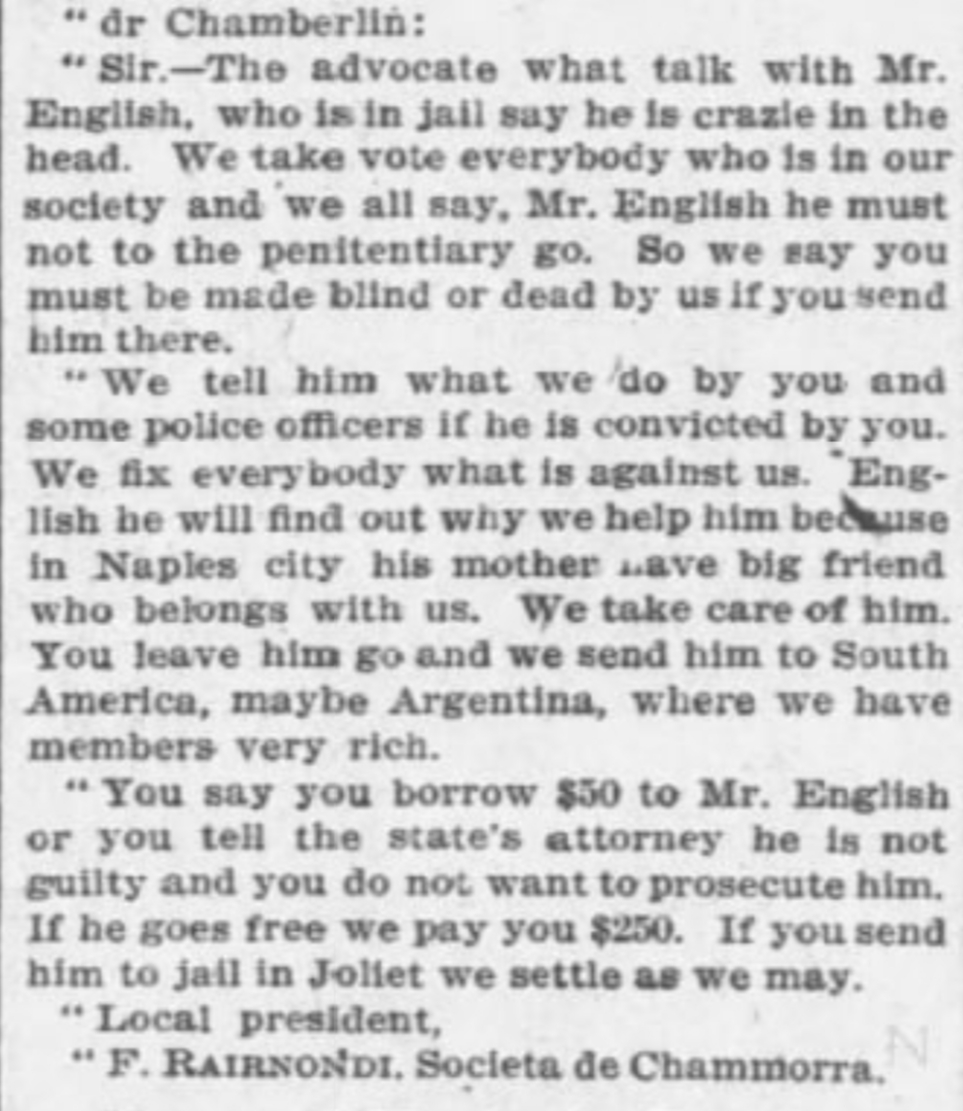
And the last one is from 1920, when Big Jim Colosimos lawyer Rocco DeStefano received a threatening letter regarding Colosimos fortune. This happened right after Colosimos demise....
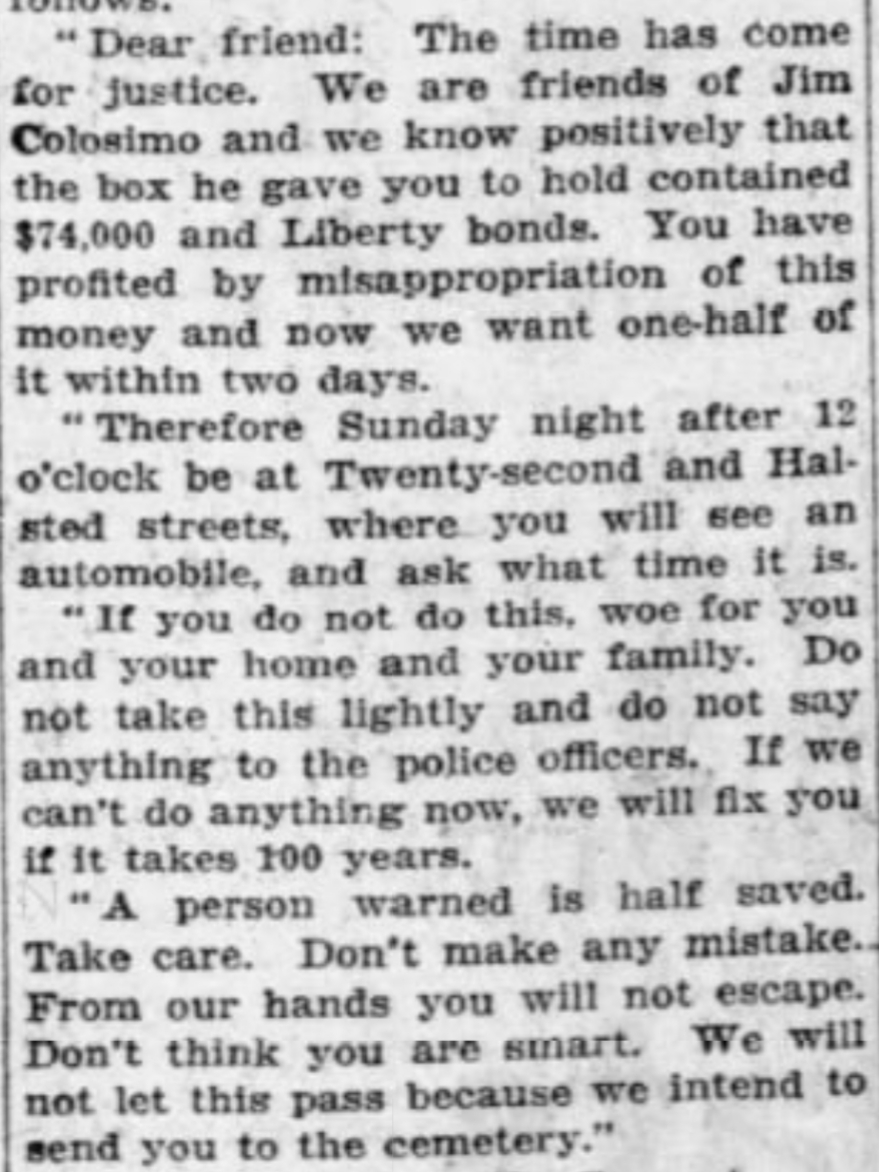
The first one (and my favorite lol)....

Second...

A third Camorra letter from a different case...

And the last one is from 1920, when Big Jim Colosimos lawyer Rocco DeStefano received a threatening letter regarding Colosimos fortune. This happened right after Colosimos demise....

Last edited by Villain on Sun Sep 13, 2020 5:13 am, edited 1 time in total.
Do not be deceived, neither the sexually immoral, nor idolaters, nor adulterers, nor men who practice homosexuality, nor thieves, nor the greedy, nor drunkards, nor revilers, nor swindlers will inherit the kingdom of God - Corinthians 6:9-10
Re: General Chicago Outfit Info Dumping Ground
It is interesting to note the sentence from the third letter in which it was said that they had their own rich members in Argentina.
Tony Mops Volpe was a mainlander who was born in Argentina and later in 1906 went to the US as illegal immigrant. It possible that first he was in Brooklyn, NY; and later ended up in Chicago as lieutenant on Taylor St under Diamond Joe Esposito and later as high level member of Capones organization. Previously Esposito also brought sugar from Argentina probably through connections such as Volpe
Tony Mops Volpe was a mainlander who was born in Argentina and later in 1906 went to the US as illegal immigrant. It possible that first he was in Brooklyn, NY; and later ended up in Chicago as lieutenant on Taylor St under Diamond Joe Esposito and later as high level member of Capones organization. Previously Esposito also brought sugar from Argentina probably through connections such as Volpe
Do not be deceived, neither the sexually immoral, nor idolaters, nor adulterers, nor men who practice homosexuality, nor thieves, nor the greedy, nor drunkards, nor revilers, nor swindlers will inherit the kingdom of God - Corinthians 6:9-10
Re: General Chicago Outfit Info Dumping Ground
Accardo and Alex acting like arbiters between Giancana and Caifano, since Mooney was screwing Caifanos wife...

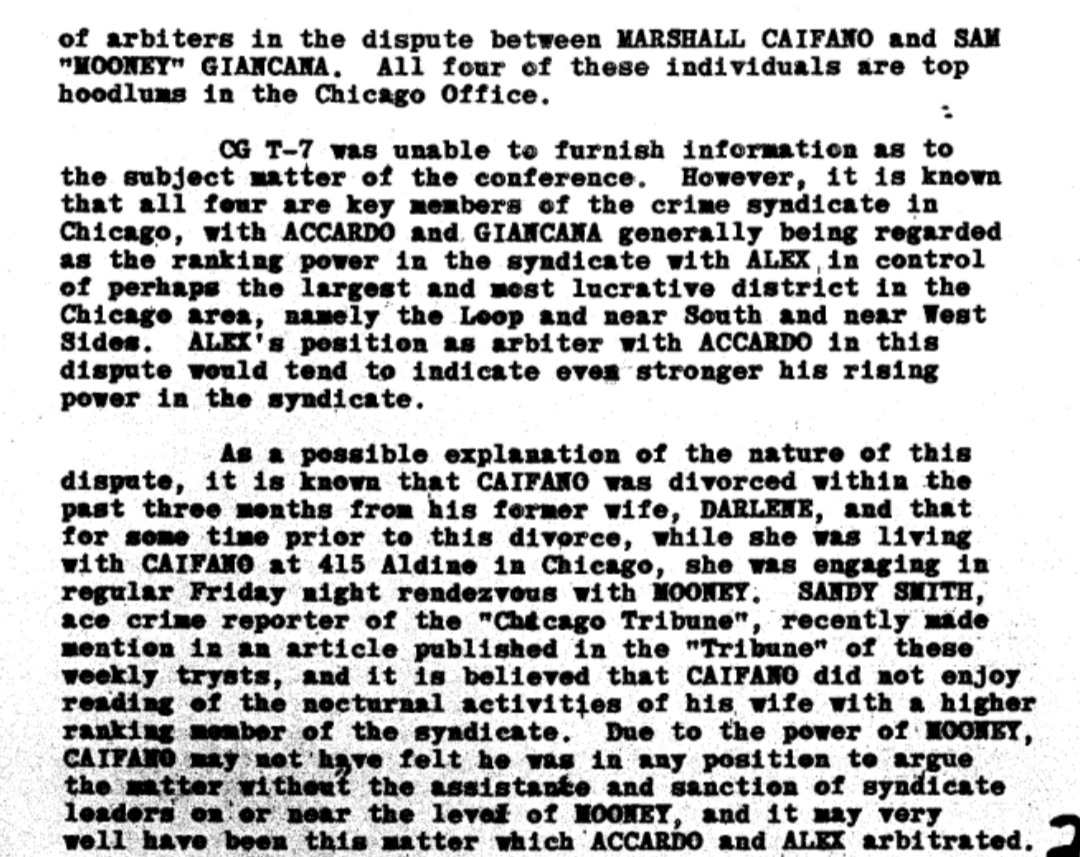
Rocco Fischetti explaining the situation with Mike Coppola to Cerone...
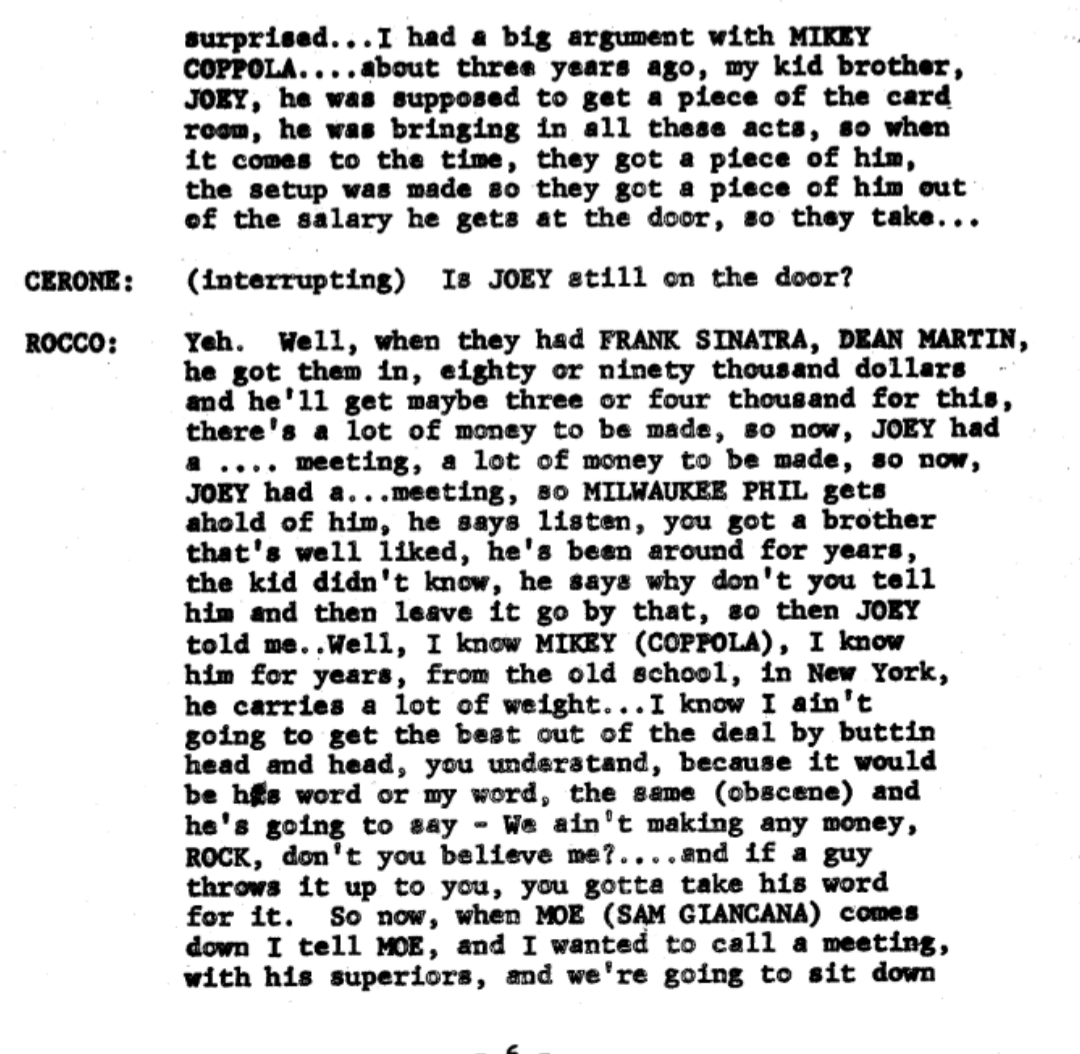
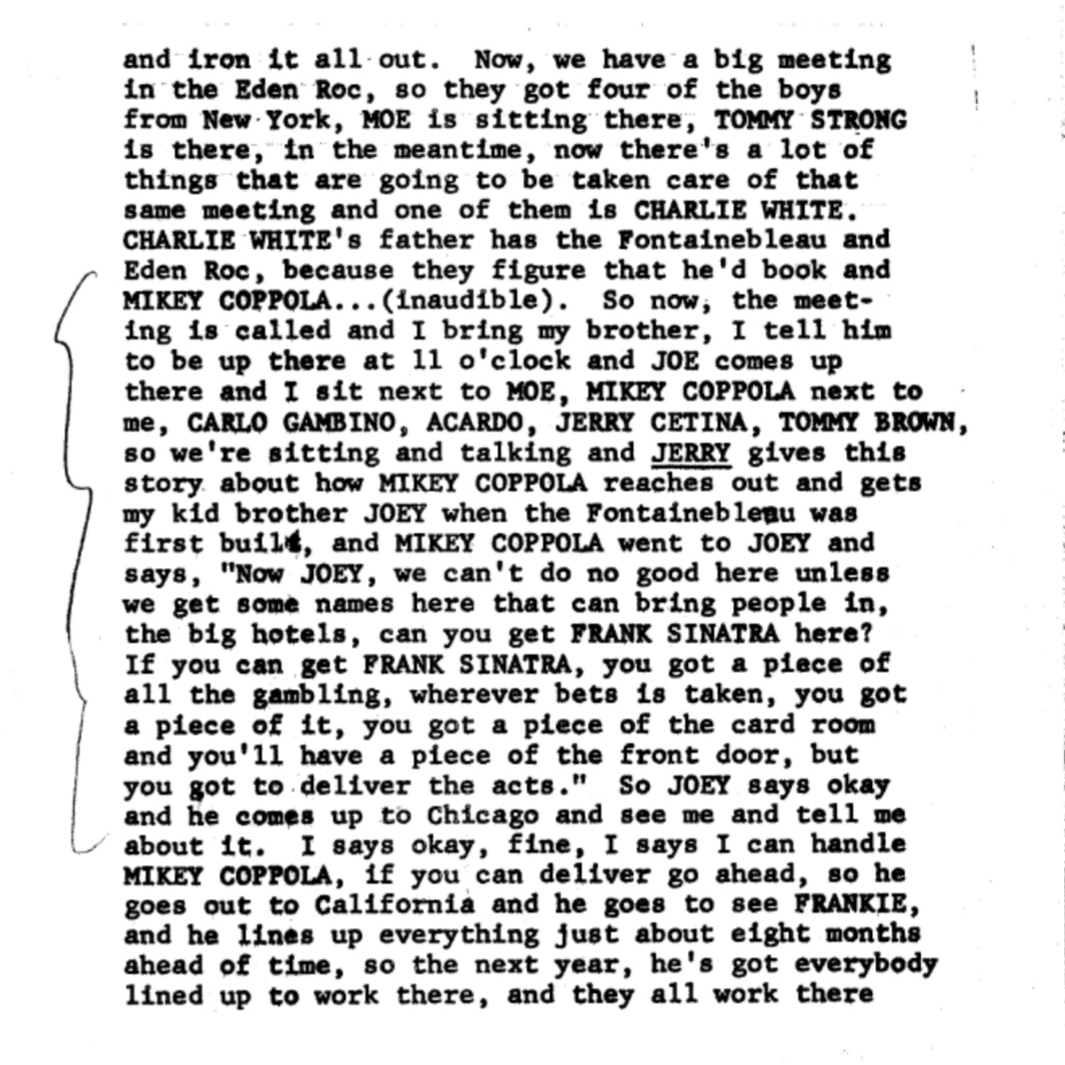
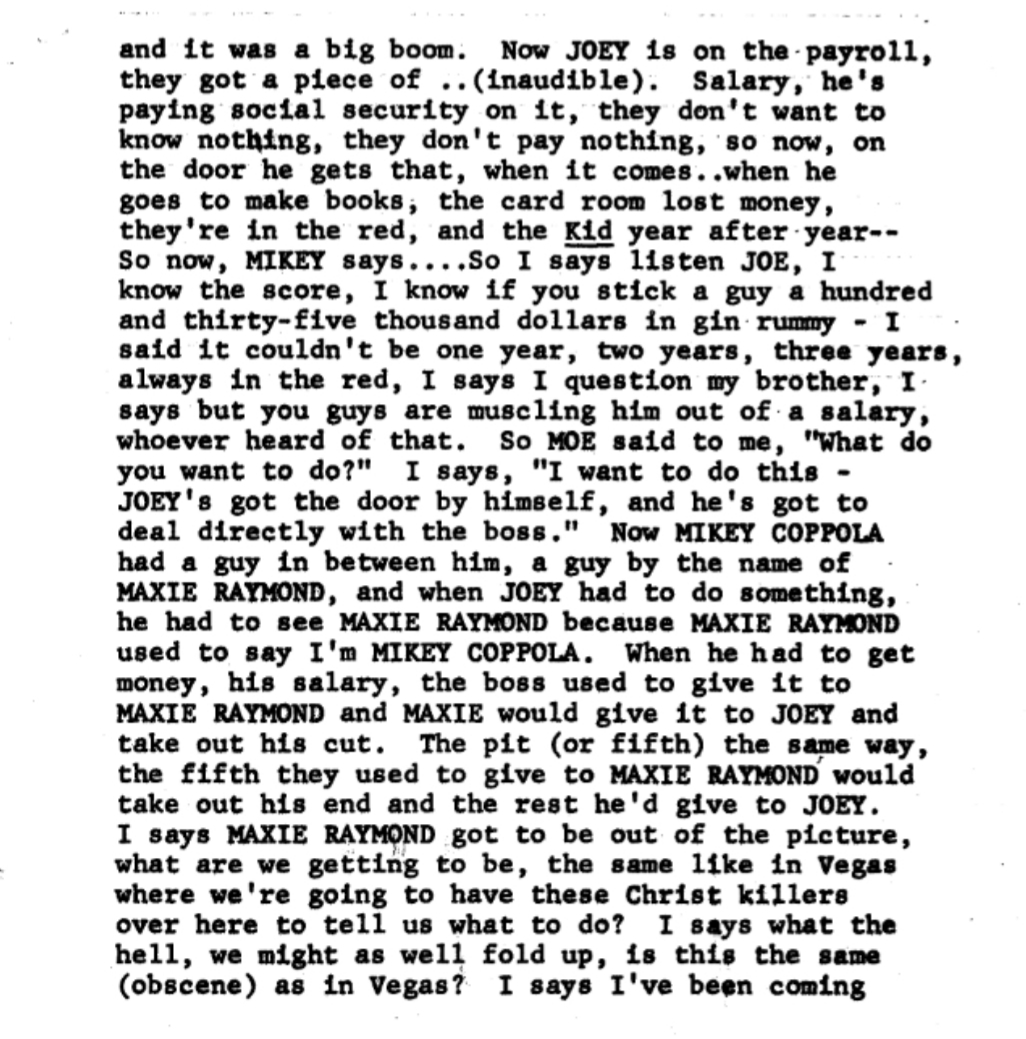
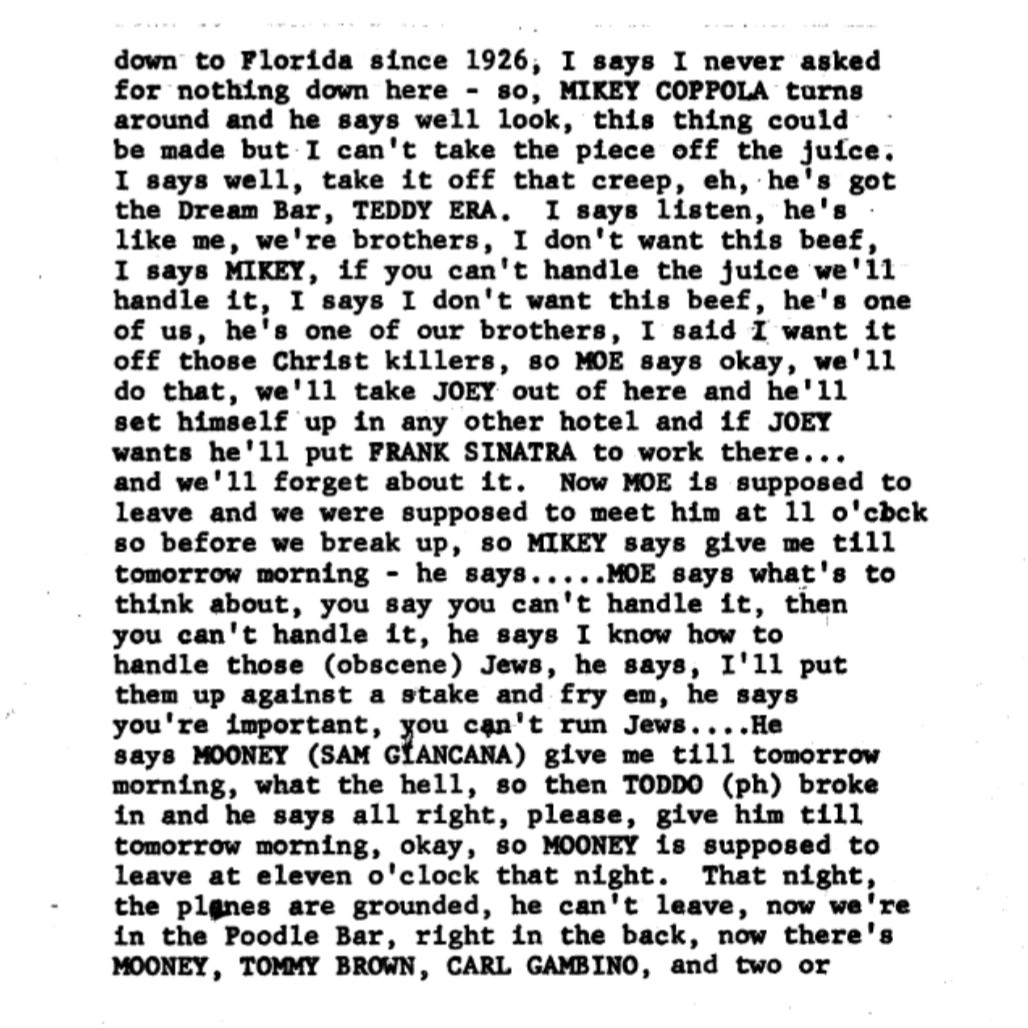
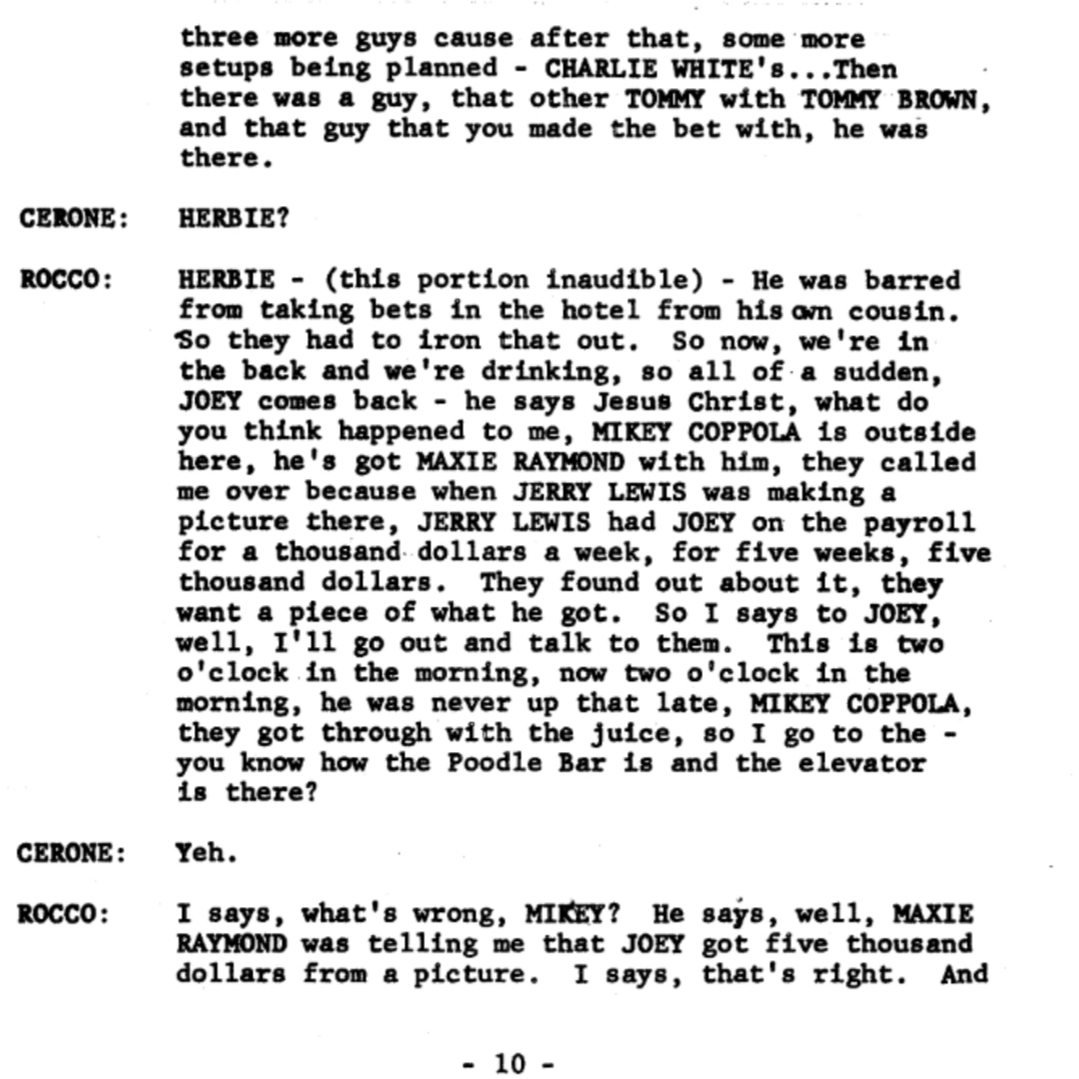
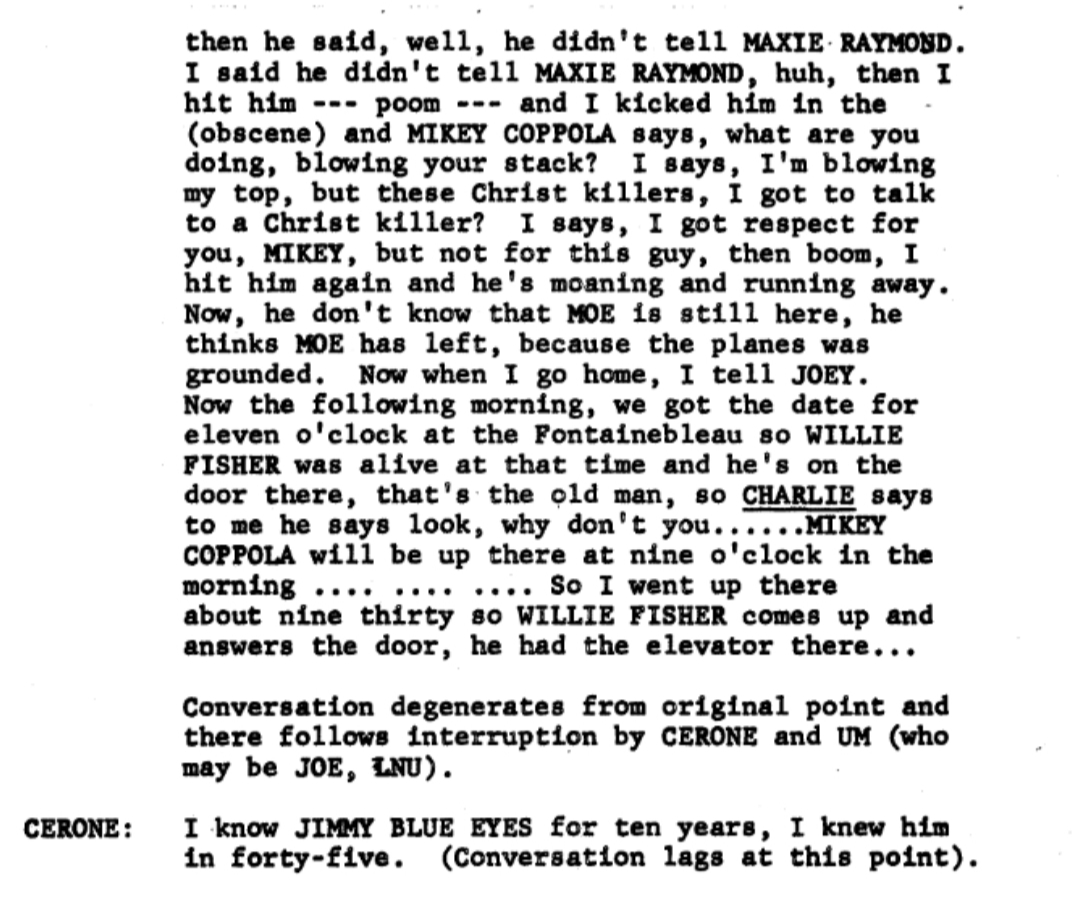


Rocco Fischetti explaining the situation with Mike Coppola to Cerone...






Do not be deceived, neither the sexually immoral, nor idolaters, nor adulterers, nor men who practice homosexuality, nor thieves, nor the greedy, nor drunkards, nor revilers, nor swindlers will inherit the kingdom of God - Corinthians 6:9-10